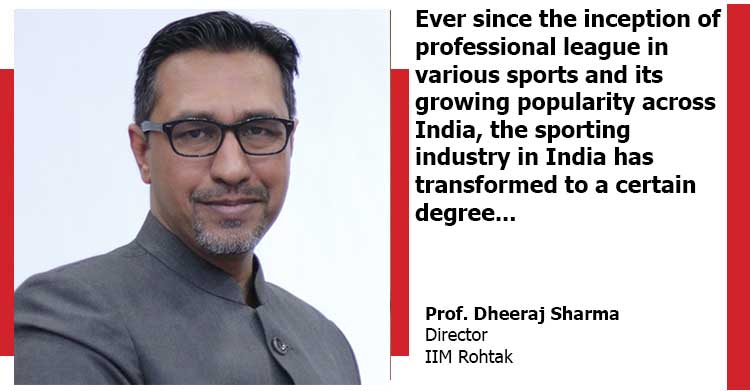An Interview with Prof. Dheeraj Sharma | Director | IIM Rohtak

Q1. IIM Rohtak is the first of all the IIMs to introduce a 2 year long Executive Post Graduate Diploma in Sports Management. Why is there an increasing requirement of management in sports now and coming years? Also elaborate how Institute is helping its students on Internship part?
Ever since the inception of professional league in various sports and its growing popularity across India, the sporting industry in India has transformed to a certain degree. Indian athletes are faring well in the global sporting competitions that gives confidence to the young sportsmen to go for more professional training and world-class sporting facilities. With this, there has been a massive demand for professionals who can work in sports marketing, sports law, financials of sports, event management, sports infrastructure management, sponsorship, and sports organizations, among others.
Witnessing this rising demand for sports management professionals, IIM Rohtak envisioned an academic program in the sports management domain. Participants of the program are offered an innovative and interdisciplinary curriculum that is at par with the best in the world to ensure professional development, academic enhancement, and skills training across various sports industry domains. As an extra step, IIM Rohtak also has the provision of scholarships for programme applicants who have represented India at Asian/Commonwealth/Olympic events. Furthermore, the institute has collaborated with Ulster University, UK, and the participants of Executive Post Graduate Diploma in Sports Management at IIM Rohtak will be eligible to obtain Masters in Sports Management from Ulster University, UK.
Q2. There is a lot of stress that is being made with regard to interaction with the industry/ companies that recruit. What is your advice to the Industry experts or HR Leaders for developing hiring strategies?
A hiring strategy needs to be holistic and forward-looking. By holistic, I mean that the hiring strategy should be aligned with organizational mission, vision, and objectives. It is comparatively easier to inculcate skills than value. Therefore, HR leaders should identify the values and attitudes they want in future employees. Soft skills are hardest to learn. Identifying the right set of soft skills in employees should be priority for the HR leaders. The hiring cycle should be synchronized with other organizational processes so that firms can meaningfully deploy professionals at the earliest. HR professional should not ignore the visible and hidden costs of hiring employees without sufficient work. Therefore, creating a facilitating environment for new employees so that they hit the ground running is key to improving efficiency in HR practices. Many organizations hire during lean periods so that experts can contribute their time more easily to the selection process. Therefore, policy and perspective committee of the organization should guide recruitment cycles.
Q3. As the Director of an esteemed Institute of India, what are the tasks you have set yourself at IIM-R?
I believe that the most important responsibility for the Director is to ensure that the highest quality of education is provided to maximum number of eligible candidates. At the tactical level, the job of the Director is to ensure a facilitating environment for the faculty to conduct top quality research and offer the best intellectual inputs to the students. In addition, Director’s role is also to keep the institution in the best financial health so that the institute can grow and prosper. Finally, the most important goal is to contribute to the nation building through all our programs, research, consulting, executive education and public policy work.
During the last several years, we have leveraged our resources to IIM Rohtak’s core competencies in providing business education and to develop new innovative programs like Integrated Program in Management and Integrated Program in Law. We have been actively promoting quality education to historically marginalized groups and regions such as women and residents of J&K and North-East respectively. We wish to continue these efforts. The institute has offered several conferences, symposiums, workshops, summits and conclaves to actively engage with various stakeholder and to make our small contribution towards India’s journey to become a five trillion-dollar economy.
Q4. What qualities are new-age companies looking for in management graduates as per your experience?
There are few qualities that all companies look for in management graduates. These include the ability to work hard; communicate clearly and apply management concepts to improve organizational efficiency and effectiveness. Additional qualities, may include a holistic understanding of how technology shapes decision-making, how geo-politics impacts trade, how culture shape consumer preferences, and how economic conditions re-prioritizes buying behaviour. Those who comprehend vicissitude of life are best positioned to contour the world of tomorrow. Another quality that new age companies prize more than traditional ones is rational risk-taking as they value individuals who feel confident enough to estimate the probability of failure and confident enough to take the plunge despite the risks associated with business venture. Measured risk-taking ability is key to commercial success.
Q5. Any suggestions you would like to give to the current youth and the aspiring students?
The youth should internalize the truth that career growth is a marathon rather than a sprint. Hence, they should focus on developing old-fashioned values like grit, resilience, discipline, and patience. They should strengthen their base by developing a solid understanding of their core academic disciplines. Simultaneously, they should also focus on the application aspect of their learnings. They should be open to the outside world rather than confine themselves to echo chambers. This would enable them to identify evolving trends and ‘ride the wind’ to success. Finally, youth must develop a service orientation and learning orientation. They must treat their work as service to the world. Also, they must realize that at the beginning of their careers they must receive a lot of inputs, guidance, and directions. Therefore, the youth will end up doing much better at the receiving end only if they are in the receiving mode. Specifically, youth should avoid making external attribution to outcomes of their action and must look within.


